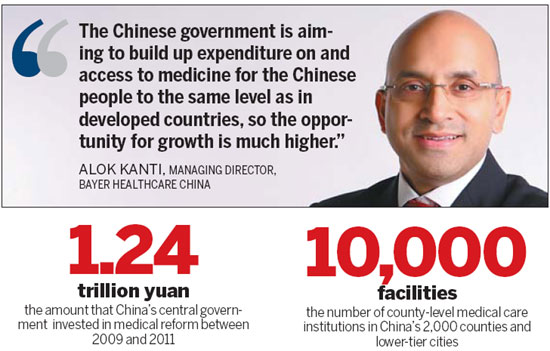Looking forward to a healthier future
|
Bayer HealthCare's Guangzhou plant. Bayer HealthCare China has maintained double-digit growth rate in China over the last decade. The country is a driving force behind the growth of the company globally. Provided to China Daily |
The Mr Flexibility of healthcare sees scope for growth across China
The interview with Alok Kanti was held in his office on the 22nd floor of the Bayer Center on Beijing's East Third Ring Road.
Luggage cases in his office immediately caught the eye. "I am leaving again for another business trip," said the new head of Bayer HealthCare in China. He has traveled all around the country over the past six months after he was appointed managing director of the German company in China. Before coming to China, his career took him from North America, on to Europe and then into the Asia-Pacific region.
From being an intern in Canada in 1994 to taking up the leading position in China, the company's fastest-growing market, the 46-year-old Indian never imagined he would work in 27 countries around the world for Bayer. He has become an expert in adapting to variation - various jobs, various markets. Kanti calls himself Mr Flexibility.
Flexibility notion
"I have worked for Bayer for 18 years but I am often quite surprised it has been that long, because I have never felt I have been doing the same thing over the last 18 years," said Kanti, whose jobs in Bayer have covered international management, international strategic marketing and commercial operations in markets as diverse as the United States, New Zealand, Brazil, the Philippines, Singapore and now China.
Concerning leadership, Kanti prefers "participative management", which involves not taking the experience garnered in one country into a new one but asking questions, listening and understanding how the market is evolving and then taking action using the knowledge gained.
People are encouraged to be flexible in Bayer, dealing with various challenges by being given the space and autonomy to do what they want. The method helps develop leadership, integrity and efficiency, essential values of the German conglomerate. The notion has become deeply ingrained in Kanti's mind and has greatly influenced his approach to management.
To date, high turnover, especially in the sales sector, and difficulties attracting talented people, particularly in the research and development unit, are the greatest challenges to multinational pharmaceutical companies in China.
Kanti admits this is true for his company, but said he believes the performance-based system at Bayer makes the company competitive in terms of remuneration with a positive culture to help talent develop professionally.
Although the new leader at Bayer HealthCare China seems confident in his management ability in China, the emerging market is still a place with opportunities and challenges. As Vice-Premier Li Keqiang said, the country's reform of its healthcare system has entered "uncharted waters", which can be taken to mean there are many uncertainties in the market.
China's market is changing rapidly due to medical reform, economic development, increasing incomes, as well as rising consciousness about health.
Kanti said the company will make progress as the market evolves, but he himself does not really want to change much at Bayer HealthCare China, "as it already has a lot of talented people, capability and focus on execution".
China is carrying out an ambitious reform of the healthcare system. Between 2009 and 2011, the central government invested 1.24 trillion yuan ($199 billion) in it, 391 billion yuan more than the original plan. Spending in China's pharmaceutical market hit $71 billion last year, ranking it as the world's third-largest market. The figures were $27 billion in 2006, ranking the country ninth in the world, according to a report from McKinsey & Co.
However, the starting base in China is lower than in developed countries, with medical expenditure making up about 5.1 percent of the nation's gross domestic product in 2011, compared with 17 percent in the United States and 10 percent in the United Kingdom.
"The Chinese government is aiming to build up expenditure on and access to medicine for the Chinese people to the same level as in developed countries, so the opportunity for growth is much higher," said Kanti.
"On the other hand, we don't want to underplay the challenges we face as health reform is happening and significant changes in the industry are taking place. We have to challenge ourselves to be ahead of the curve over these changes," Kanti said, adding the company's respect for flexibility also involves being ready to take different approaches to work, taking in new ideas, and looking at how people can build on them.
Bayer HealthCare China has maintained double-digit growth in the emerging market over the last decade. It's expecting sustainable growth in the nation.
"We occupy the leading position in key cities and want to expand to the lower-tier cities," said Kanti.
Lower-tier markets
A report conducted by international business management and strategy advisory firm Boston Consulting Group said county-level hospitals and community healthcare centers in China have the greatest potential now. Annual growth of the two channels exceeded 30 percent over the last three years.
"Bayer has done well in the community healthcare sector, making up 4.8 percent of the market in 2010, the second-largest among all domestic and multinational companies in China," said Magen Xia, principal of BCG Greater China.
She attributed the success to the Bayer Health House program, which was initiated in 2006. Each "house" acts as a platform for diabetes education, free doctor consultancy services and communication with patients. The program has set up more than 400 such houses in hospitals and communities in 30 cities around China.
Chronic disease treatment is one of the competitive edges of Bayer HealthCare, which it has been making efforts to explore and will continue to do so.
Kanti took the example of hypertension: "About 18 to 20 percent of the population suffers from hypertension, so treating these people not only improves the outcome for the country per se but also creates opportunities for us."
Kanti believes there are lower treatment rates but faster growth, which "doubles the excitement of the market".
BCG's Xia said the favorable scenario for multinational companies is that more hypertension patients have switched from local to multinational brands in the 30 richest cities around China.
In the county-level hospital sector, involving around 10,000 facilities in 2,000 counties and lower-tier cities, local companies are still key players. Only Denmark-based Novo Nordisk AG entered the top 20 list in 2010, taking a 0.8 percent market share.
Kanti said that Bayer is making lower-tier cities one of its priorities in China.
The company is divided into three regions: north, south and west. Each is responsible for its own lower-city market expansion. It helps the company cope with China's vastness and diverse geographic and demographic conditions and helps increase efficiency.
Bayer HealthCare started its Go West Project in 2007 and has invested 20 million yuan to provide free training for doctors and hospital heads in poverty-stricken areas, another move by the company to work with the government to develop China's healthcare infrastructure.
While the emerging sectors are not easy to handle, a BCG report said the large size and fragmentation of the market is the first challenge any multinational company faces. Others include policy issues, inconsistency in the criteria for the nation's Essential Drugs List and market access to key provinces and municipalities.
They all challenge the pharmaceutical company's market judgment and decision making.
Kanti said the most important thing for him to do is to understand the market and the people. During his first six months in China, he traveled a lot and talked to people a lot.
"We have a large organization of 6,500 people around the nation. It is important to listen and maximize the creativity and drive momentum these people created for the organization," he said.
The people, the company's innovative new medicines and a very rich product portfolio on chronic diseases that the aging Chinese population needs most can support continuous growth for Bayer HealthCare in China, he added.
liujie@chinadaily.com.cn

(China Daily 12/20/2012 page15)



















